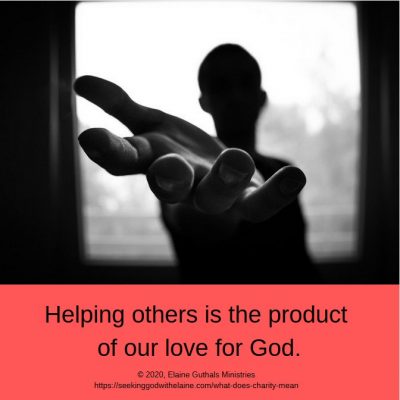We think of charity as helping others, but is it more than that? This devotion looks at helping others through love.
Nuggets
- God want us to be purposeful — fulfilling His purpose.
- The most important act of love we can give is to tell others about Jesus.
- We have to love God and others more than things of this world.
- Helping others is the product of our love for God.

My word for the year is self-discipline. When I was researching another post, I came across Vincent’s sermon entitled The Lesson of Ripeness. It talks about the need to grow in our relationship with God.
Growing into a mature faith should be a goal of all of us. It takes self-discipline to reach it.
One thing Vincent talked about was charity. He said, “And, by reason of the time, we ought to be broader in our charity.”
Devotions in the What Is Charity? series
Let's Put It into Context
Merriam-Webster Dictionary defines charity as:
- generosity and helpfulness especially toward the needy or suffering
- benevolent goodwill toward or love of humanity
- a gift for public benevolent purposes
- lenient judgment of others
It is interesting when you compare that to the Holman Bible Dictionary’s definition. It says, “KJV translation of Greek agape.”
So, what does that mean? I looked up agape, thinking it would tell me it is God love (as opposed to brotherly love or sexual love).
Wrong. It sent me to love.
“The New Testament maintains this estimation of love throughout. The King James Version uses the word charity instead of âloveâ to translate the Greek word Paul used ( agape ). The word charity comes from the Latin caritas which means âdearness,â âaffection,â or âhigh regard.â Today, the word charity is normally used for acts of benevolence, and so the word love is to be preferred as a translation of agape. Nevertheless, the reader who comes to the agape of the New Testament with the idea of benevolence in mind is better off than the reader who comes with the idea of physical pleasure and satisfaction.” (NOTE: I think the â is supposed to be quotation marks. But that is how it is online. Moving on.)
Sorry, I have to process this.
- Love is a main theme of the New Testament.
- Charity (dearness, affection or high regard) is used to translate agape (God love).
- Today, we think of charity as acts of benevolence.
- What is meant is agape (love) flavored with benevolence.
Okay. Let’s dig into some of the references they gave to see if we can get a better handle.
A Cleansing Agent
“But give from what is within to the poor, and then everything is clean for you” (Lk. 11: 41 CSB)
Jesus had been invited over to a Pharisee’s house for supper. The problem was Jesus didn’t do the ritual washing before dinner.
Hughes brought up two good points about the hand washing ritual.
- It was “to remind constantly of the need of inward purity.”
- “But its spiritual significance was lost sight of in the mere rite itself.”
Ouch. Doesn’t that happen sometimes? We get so used to doing something, we don’t really think about why we are doing it.
We lose sight of why we started doing it in the first place. Maybe we grew up doing it because our parent grew up doing it. So, we don’t even know why it was done.
The Pharisee was being a Pharisee. He was looking at ritual — tradition.
Jesus, being Jesus, called him on it. More than that, He told him how to fix the problem.
Yes, the Jews had known for a long time that God didn’t look on the outside. “But the LORD said to Samuel, ‘Do not look at his appearance or his stature because I have rejected him. Humans do not see what the LORD sees, for humans see what is visible, but the LORD sees the heart’” (I Sam. 16: 7 CSB). Just as we shouldn’t wash our hands just as a routine, we shouldn’t do the benevolence without the love.
God isn’t interested in us mindlessly doing things. He want us to be purposeful — fulfilling His purpose.
Sometimes, we think we will just give our money — but not our time. Sometimes, we give our time — but not if we are one-on-one with people.
What is Jesus saying? It isn’t just about doing. It is about why you are doing.
“But give from what is within to the poor …” (Lk. 11: 41 CSB). Who is within us? Jesus. How is Jesus within us?
- “In the beginning was the Word [Jesus], and the Word was with God, and the Word was God” (Jn. 1: 1 NIV). We learn of Him through studying God’s Word.
- “I have hidden your word in my heart that I might not sin against you” (Ps. 119: 11 NIV). When we accept Jesus as our Savior, we invite Him into our hearts.
The most important act of love we can give is to tell others about Jesus. If we put that as our focus, we are clean.
Remember, we have talked about clean before. “Cleanness was thus fundamental to the establishing and preservation of holiness in the Israelite community.”
To read a related devotion, click the appropriate button below.
To be clean is to be holy. To be holy is to be set apart, perfect, and pure. To be holy is to be like God. To be like God, we care about others. When we do charity, we are caring about others.
Giving All for Others
“Sell your possessions and give to the poor. Provide purses for yourselves that will not wear out, a treasure in heaven that will never fail, where no thief comes near and no moth destroys” (Lk. 12: 33 NIV)
Does God expect us to sell everything we have? Well, maybe sometimes. He may be calling us to a mission field where we do.
Does God want us to sell what we have to help others? Well, maybe.
I think what this is saying here is possessions aren’t supposed to be our focus. Our focus should be “purses … that will not wear out, a treasure in heaven that will never fail …” (Lk. 12: 33 NIV).
Jones said, “The charity must come, not merely from the treasury, but from a tender and sympathetic heart.” If we are working with God’s love, the money aspect isn’t the focus. The focus is doing God’s Will.
We have to love God and others more than things of this world. We have to be doing this charity work for God’s purposes, not for our own edification.
Van Doren said, “This is not a command that no money be kept for our own use, but that righteousness should not be neglected through fear of poverty.” Disciples follow God’s promptings to help others, regardless of the cost, because we know He will provide for us.
It is a command to follow God’s call. It is a command to do things through love. “If I gave everything I have to the poor and even sacrificed my body, I could boast about it; but if I didn’t love others, I would have gained nothing” (I Cor. 13: 3 NLT).

An Example of Charity
“There was a believer in Joppa named Tabitha (which in Greek is Dorcas). She was always doing kind things for others and helping the poor” (Ac. 9: 36 NLT)
We were given an example of someone who was known for their charity. Tabitha (also called Dorcas) was an early disciple known for her good deeds for others.
This is told in the back half of the verse. We have to remember, though, that everything is included in the Bible for a reason.
I think the reason this example is included is not because of the works Tabitha did. It is more than that.
I think this was included because it speaks to her character. We’ve been talking about character a lot lately.
- His laws and commandments are supposed to affect our character or our core – our heart level (Getting Obedience to the Heart Level).
- We have to change our character so that we live our lives according to how He calls us (What Is the Relationship Between Righteousness and Holiness?).
- We need to resemble God’s moral character (What Is the Relationship Between Righteousness and Holiness?).
- Obedience builds character (What Is the Relationship Between Righteousness and Wisdom?).
To read a related devotion, click the appropriate button below.
We’ve talked about not needed works for salvation. However, works show that we have been and are being sanctified.
To read a related devotion, click the appropriate button below.
Jones made an interesting point. He said, “Mention is specially made of Dorcas’s works. In her are perceived the true development of the Christian life. Her natural powers are hallowed in discipleship; her discipleship is perfected in beneficence. When the Christian life stops short in discipleship, it remains in the embryo stage, and is in danger of dying of inanition.”
Ooo, baby. How is that a connection? Embryo stage — milk baby. Grow — being sanctified. Mature faith — steak adult.
To read a related devotion, click the appropriate button below.
This translation says, “… She was always doing …” (Ac. 9: 36 NLT). Some say she was “… full of …” (ESV, NKJV, KJV) or “… abounding with …” (NASB). The Good News Translation says, “She spent all her time ….” This was not only her character, but also her passion.
To me, this means that, because of her character, Tabitha was committed to helping others. Helping others is the product of our love for God.
No, the passage didn’t say Tabitha sold everything she had. It does say, however, that she did good deeds. It implies that she was invested in those who whom she ministered.

Making the Connections
Okay, we’ve covered a lot of ground. Let’s do a recap.
- purposeful
- holy
- focus
- righteousness
- character
- being sanctified
- mature faith
Part of God’s Will for us is to love and support others. When we purposefully focus on doing His Will, we become holy like Him. We build our character as we mature our faith. This happens through sanctification, with the end goal righteousness.
Charity for disciples should be all about showing God’s love for them. By doing that, we are expanding God’s kingdom.
Making the Connections to Self-Discipline
Sometimes, we have to discipline ourselves to take the focus off of us. We may have to discipline ourselves to step out of our comfort zones. We may have to discipline ourselves to let God lead.
How Do We Apply This?
Tabatha was a seamstress. We know that because “… And all the widows approached [Peter], weeping and showing him the robes and clothes that Dorcas had made while she was with them” (Ac. 9: 39 CSB). I bet she made clothes for the poor. To me, that means we use our talents helping others.
The “others” are whomever God calls us to serve. We have to listen to Him to see where He is calling us.
We have to remember that we have to love and serve others God’s way, not the world’s way. Hughes said, “In social life our Lord gives us an example of inflexible righteousness, conjoined with loving sympathy.” His way is always to expand His kingdom.
Isn’t that the best way to show others we live them? We introduce them to the Sovereign God who can give them eternal life.
Father God. You have called us to be Your children. You want us to be like You. Help us to love and serve others as You would have us do. Use us to introduce them to You so that they may know You as we do. Amen.
What do you think?
Leave me a comment below (about this or anything else) or head over to my Facebook group for some interactive discussion.
If you don’t understand something and would like further clarification, please contact me.
If you have not signed up for the email daily or weekly providing the link to the devotions and the newsletter, do so below.
If God has used this devotion to speak with you, consider sharing it on social media.
Pingback: Disciples’ Duty to the Poor – Seeking God with Elaine
Pingback: Does God Really Forgive and Forget Sin? – Seeking God with Elaine
Pingback: Focus on Love, Not Evil – Seeking God with Elaine
Pingback: A To Do List for Life – Seeking God with Elaine
Pingback: What Is Liberality? – Seeking God with Elaine
Pingback: Disciples and Charitableness – Seeking God with Elaine
Pingback: The Lenient Judgment of Others – Seeking God with Elaine
Pingback: In Support of Widows – Seeking God with Elaine
Pingback: Why Should We Love Our Enemies? – Seeking God with Elaine
Pingback: Peace and Safety Are the Rewards for Morality – Seeking God with Elaine